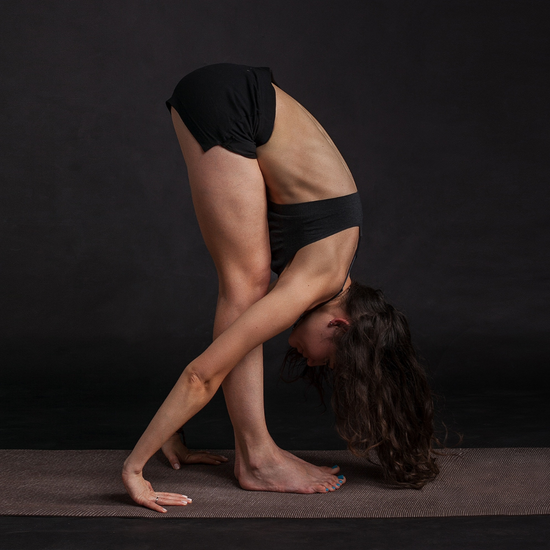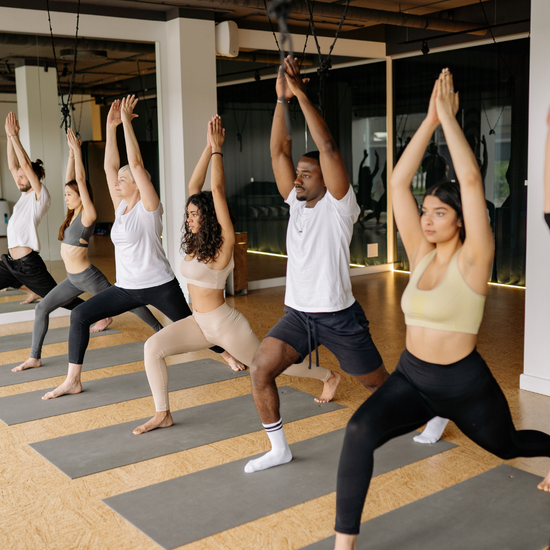The ancient art of yoga is practised worldwide today. This article will explore its history and show you how it can help improve your health.
What is Yoga?
Yoga is the union of mind, body and spirit. Yoga is at least 5000 years old, possibly older. India’s spiritual leader, Patanjali, can be credited with organising the practice of yoga into an ‘eight limbed path’ – or modern yoga as we know it, and he is often considered the father of yoga. He believed that meditation helped one become aware of their true self and overcome emotional and physical pain. His teachings have inspired people, including millions around the world today.
Yoga is usually associated with stretching, breathing exercises, and postures that strengthen muscles and improve flexibility. There are many different types of yoga, here are just a few of the popular styles we see today:
Vinyasa
Vinyasa is a style of yoga where movement is coordinated with your breath and you flow from one pose to another. It is often thought of as one of the more athletic styles of yoga. The synchronisation of breath and movement helps calm the nervous system. Ashtanga yoga and other power yogas are types of vinyasa.
Yin Yoga
Yin yoga is a slow style of yoga where postures are held for long periods of time (up to 5 minutes). It is a meditative style of yoga – great for beginners especially as the poses utilise props and can often be quite relaxing – allowing gravity to do the work. Yin is becoming increasingly popular.
Hot Yoga (sometimes known as Bikram Yoga)
Hot yoga is a form of yoga that was started by Bikram Choudhury This type of yoga originally consisted of 26 postures performed twice in a heated room which can be up to 38 degrees Celcius. The heat relaxes the body and encourages sweating so it is important to hydrate during and after these classes.
Hatha
‘Hatha’ is simply a term for physical yoga – and so it encompasses all the styles of physical yoga – as opposed to non-physical. There are other branches of yoga like karma, raja and kriya yoga which are not based on physical practice.
In the west, Hatha yoga is often suitable for beginners as classes can be slower and focus on strengthening the body while relaxing the mind. The postures target specific body areas, such as the spine, shoulders, neck, chest, stomach, back, legs, wrists, ankles, toes, etc.
Iyengar Yoga
This form of yoga was founded by B.K.S. Iyengar focuses on correct alignment and breath control. Props are used and poses are held for a longer time – this helps one to go deeper into a pose in a safe and controlled way. These classes are great for stretching and relaxing.
Integrated
Integrated yoga is a combination of several types of yoga. For example, it may combine Bikram yoga with Hatha or vice versa.
Kundalini
Kundalini yoga is a form of yoga that utilises fast-moving postures and breathing exercises that can be quite intense. Chanting and mantras are also used and the technique is thought to awaken the energy within the human body (seen as being trapped in the lower spine). It’s not recommended for beginners, and an experienced teacher is necessary.
Mystical
Mystical yoga teaches an individual to transcend the limitations of the ego and discover their inner being. It involves meditation, chanting, breath control, and visualisations.
Asanas (postures)
There are hundreds of possible poses that can be found in any yoga class. In all yoga classes, postures can be modified to suit beginners or those with injuries. Rest is also always an option.
Benefits of Yoga
Medical professionals around the world have recognised yoga as one of the best ways to prevent diseases and reduce stress. Here are some of the health benefits of yoga:
Stress relief
Stress is a major factor contributing to depression and other mental illnesses. You can release the negative emotions associated with stress by practising yoga daily. Even though it might seem difficult at first, anyone can succeed when starting yoga.
Healthy weight maintenance
Vigorous yoga has been proven to burn fat and can aid in weight loss. More gentle yoga will also help you maintain a healthy weight as it reduces anxiety and promotes relaxation.
Improves cardiovascular health
Some studies have shown that yoga reduces blood pressure in patients with hypertension. Other research shows that yoga increases oxygen flow to the brain and lowers heart rate. Both of these factors improve cardiovascular health.
Digestion
Practising yoga can lead to better digestive function. Studies show that those who practice yoga have less constipation and diarrhoea. Research also suggests that yoga may reduce the risk of colon cancer.
Flexibility
People who practice yoga regularly tend to have greater flexibility. Flexibility allows us to perform basic tasks without straining our bodies.
Strength
Yoga can increase muscle mass and strengthen bones. Another study found that yogis had increased bone density compared to others. Because of this, practitioners of yoga are generally stronger than non-yogis.
Breathing
It is believed that yoga helps regulate breathing patterns. A study on adults with chronic obstructive pulmonary disease (COPD) showed that yoga decreased symptoms such as shortness of breath.
Balance
Balance is an essential part of good health. People who practice yoga tend to have better balance than their non-yogi counterparts. A study showed that even a few minutes of yoga each day improved balance.
Energy
When we experience stress or fatigue, we tend to feel lethargic. Yoga teaches us how to relax and focus on ourselves and gives us the ability to cope with life’s challenges.
Concentration
Because yoga focuses on the mind, it encourages concentration. Concentration leads to better memory and learning abilities.
Self-confidence
We learn to control our bodies and mind when we practice yoga. With time, we become more confident and able to handle situations that would otherwise overwhelm us.
Spirituality
The word “spirituality” comes from the Latin word spiritus, meaning “breath”. We connect with our inner soul through pranayama and meditation when we practice yoga. We also develop compassion and empathy towards others.
At Anjali Generation, we can support your yoga practice with eco-friendly yoga mats and accessories. Visit our range of yoga products today and get in touch with any questions.





